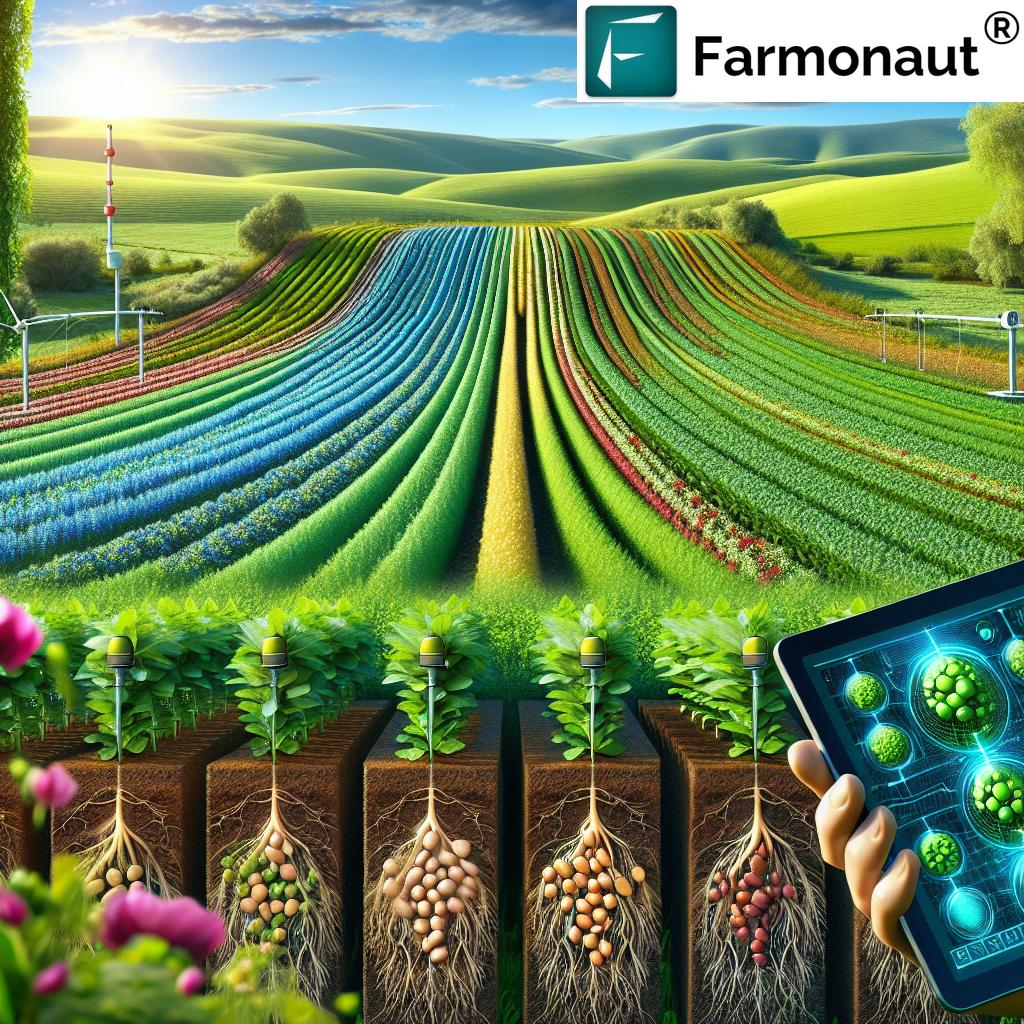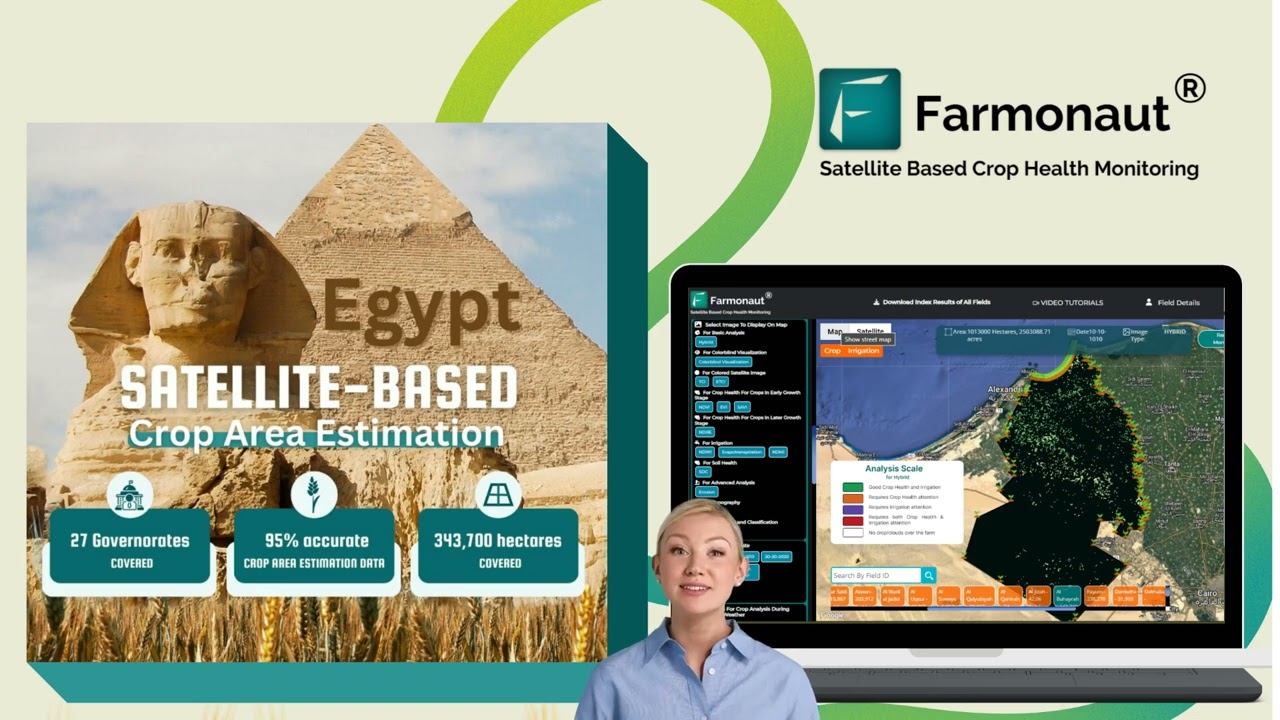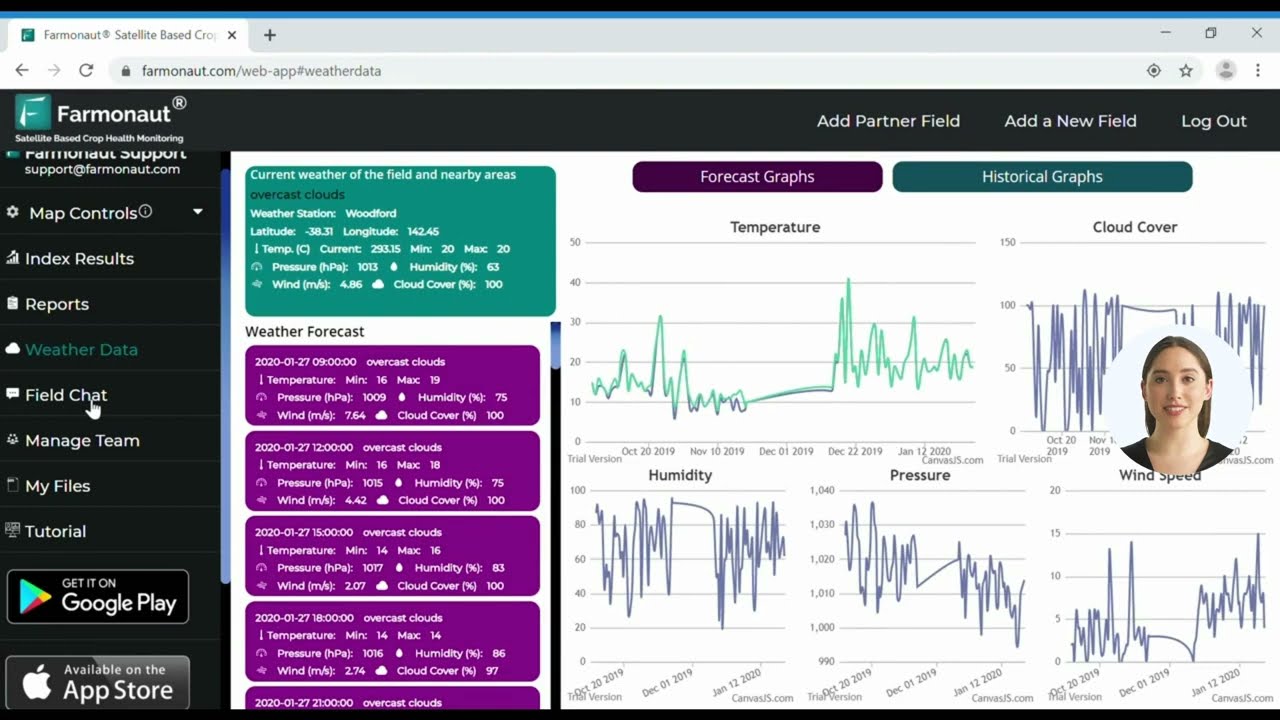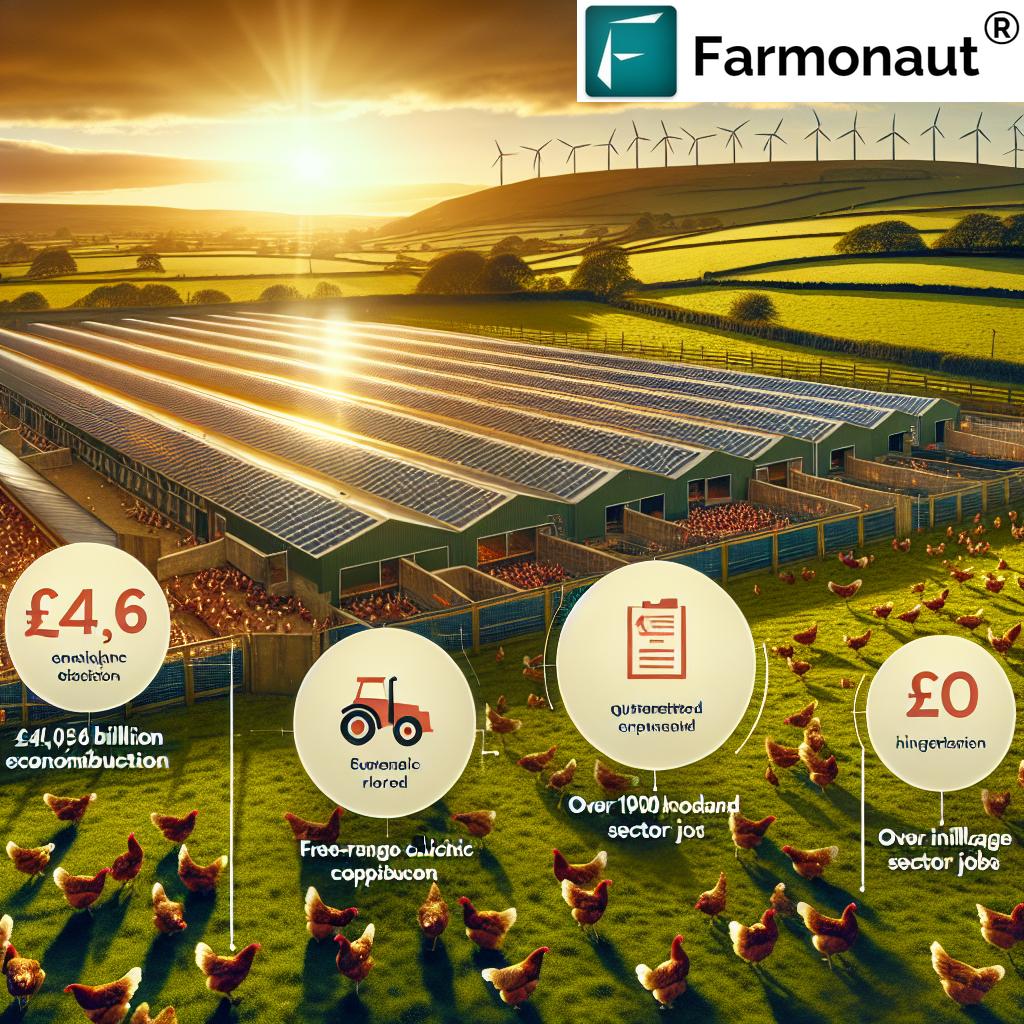UK’s £3M Boost for Climate-Resilient Pulse Crops: Revolutionizing Sustainable Agriculture
“UK invests £3M in climate-resilient pulse crop research, targeting peas, beans, and other protein-rich legumes.”
In an exciting development for sustainable agriculture, the UK has recently announced a significant £3 million investment in research focused on climate-resilient pulse crops. This funding marks a crucial step towards revolutionizing our approach to farming and food production in the face of climate change. At Farmonaut, we’re thrilled to see this commitment to advancing sustainable agriculture practices and supporting farmers in adapting to environmental challenges.
As pioneers in agricultural technology, we understand the importance of innovative solutions in the farming sector. Our satellite-based farm management solutions are designed to complement and enhance such research initiatives, providing farmers with real-time insights into crop health and environmental conditions. Let’s delve into the details of this groundbreaking research and explore how it could transform the future of agriculture.
The Rise of Climate-Resilient Legume Crops
Climate-resilient legume crops are at the forefront of sustainable agriculture practices. These pulse crops, including peas, beans, and other protein-rich legumes, offer multiple benefits to both farmers and the environment. The UK’s investment in pulse crop genetic improvement is a testament to the growing recognition of these crops’ potential in addressing climate change challenges and enhancing food security.
- Improved soil health
- Reduced dependency on nitrogen fertilizers
- Enhanced protein content for human and animal nutrition
- Increased resilience to climate variability
As we at Farmonaut continue to develop our AI-driven farm advisory tools, we’re excited about the potential synergies between our technology and these climate-resilient crops. Our Jeevn AI system, for instance, could provide valuable insights to farmers cultivating these new varieties, helping to optimize their growth and yield.

The Benefits of Incorporating Pulse Crops in Crop Rotations
One of the key advantages of pulse crops is their ability to improve soil health when incorporated into crop rotations. This practice aligns perfectly with sustainable agriculture practices and offers numerous benefits:
- Nitrogen Fixation: Legumes have a unique ability to fix atmospheric nitrogen, reducing the need for synthetic fertilizers.
- Soil Structure Improvement: The deep root systems of pulse crops help improve soil structure and water retention.
- Pest and Disease Management: Crop rotation with pulses can break pest and disease cycles, reducing the reliance on chemical controls.
- Biodiversity Enhancement: Diverse crop rotations support a wider range of beneficial insects and microorganisms.
At Farmonaut, our satellite-based crop health monitoring system can help farmers track the positive impacts of incorporating pulse crops into their rotations. By providing real-time data on vegetation health and soil moisture levels, we enable farmers to make informed decisions about their crop management strategies.
Tackling Challenges in Pulse Crop Cultivation
While pulse crops offer numerous advantages, they also face certain challenges that researchers are working to address:
- Root Rot in Peas: A significant issue affecting pea crops, leading to yield losses.
- Pest Infestations in Fava Beans: Various pests can damage fava bean crops, reducing productivity.
- Climate Adaptability: Developing varieties that can thrive in changing climate conditions.
Scientists are employing advanced breeding techniques and gene editing to tackle these issues, aiming to develop pest-resistant pulse crops that are adaptable to climate change. This research is crucial for ensuring the long-term viability of pulse crop cultivation in the face of environmental challenges.
Enhancing Nutritional Traits in Pulse Crops
Beyond improving resilience, researchers are also focusing on enhancing the nutritional traits of pulse crops. This includes:
- Increasing protein content
- Enhancing mineral concentrations
- Improving amino acid profiles
These nutritional enhancements are particularly important as we seek to develop more sustainable protein sources for both human consumption and animal feed. As the demand for plant-based proteins grows, these improved pulse crops could play a crucial role in meeting global nutritional needs.
At Farmonaut, we’re committed to supporting farmers in maximizing the potential of these nutritionally enhanced crops. Our AI-based advisory system can provide tailored recommendations for optimal cultivation practices, ensuring that farmers can achieve the best possible yields and quality from these improved varieties.
Preparing for Future Climate Scenarios
“Scientists aim to develop pulse crops adaptable to anticipated temperature rises, potentially affecting millions of farmers globally.”
The research funded by this UK initiative isn’t just focused on current challenges; it’s also looking ahead to prepare for anticipated climate changes. Scientists are developing pulse crop varieties that can withstand higher temperatures and more erratic weather patterns. This forward-thinking approach is crucial for ensuring food security in the face of climate change.
Key areas of focus include:
- Drought tolerance
- Heat resistance
- Improved water use efficiency
- Resilience to extreme weather events
By developing crops that can thrive in these challenging conditions, researchers are helping to future-proof our agricultural systems. This aligns perfectly with our mission at Farmonaut to make precision agriculture accessible and affordable for farmers worldwide.

Advanced Breeding Techniques and Gene Editing
The development of climate-resilient and nutritionally enhanced pulse crops relies heavily on advanced breeding techniques and gene editing. These cutting-edge methods allow researchers to:
- Identify beneficial traits more quickly
- Introduce desirable characteristics with greater precision
- Accelerate the breeding process
- Create varieties with multiple improved traits
While traditional breeding methods have been successful in the past, these newer techniques offer the potential for more rapid and targeted improvements. This is crucial given the urgency of addressing climate change and food security challenges.
At Farmonaut, we’re excited about the potential of these advanced breeding techniques. Our satellite-based monitoring systems can provide valuable data to researchers and breeders, helping to assess the performance of new varieties in real-world conditions across different environments.
The Impact on Sustainable Agriculture Practices
The development of climate-resilient pulse crops has the potential to revolutionize sustainable agriculture practices. By incorporating these improved varieties into their crop rotations, farmers can:
- Reduce their reliance on synthetic fertilizers
- Improve soil health and biodiversity
- Enhance their farms’ resilience to climate variability
- Diversify their crop production
- Contribute to more sustainable food systems
These benefits align perfectly with the growing global emphasis on sustainable and regenerative agriculture. As farmers adopt these new varieties and practices, they’ll be better equipped to meet the challenges of feeding a growing population while minimizing environmental impact.
Our team at Farmonaut is committed to supporting this transition to more sustainable farming practices. Our blockchain-based traceability solutions can help document and verify the use of these climate-resilient crops, providing transparency throughout the supply chain and potentially opening up new market opportunities for farmers.
The Role of Technology in Maximizing Pulse Crop Potential
While the development of climate-resilient pulse crops is a significant step forward, maximizing their potential requires the integration of advanced agricultural technologies. This is where solutions like those offered by Farmonaut come into play.
- Satellite-Based Crop Monitoring: Our advanced monitoring systems can track the health and development of pulse crops in real-time, allowing for timely interventions and optimized management.
- AI-Driven Advisory: Our Jeevn AI system can provide tailored recommendations for pulse crop cultivation, taking into account local conditions and the specific needs of these new varieties.
- Precision Resource Management: By leveraging our technology, farmers can optimize their use of water, fertilizers, and other inputs, maximizing efficiency and sustainability.
- Climate Risk Assessment: Our tools can help farmers assess and mitigate climate-related risks, ensuring the resilience of their pulse crop production.
By combining these technological solutions with the latest advancements in pulse crop genetics, we can create a powerful synergy that drives sustainable agricultural practices forward.
The Global Impact of UK’s Research Investment
While the £3 million investment is focused on research in the UK, the potential impact of this work is truly global. Climate-resilient pulse crops could benefit farmers and communities worldwide, particularly in regions facing significant climate challenges. Some potential global impacts include:
- Enhanced food security in vulnerable regions
- Improved nutrition in areas reliant on plant-based proteins
- Reduced environmental impact of agriculture on a global scale
- Knowledge sharing and technology transfer between countries
- Increased resilience of global food systems to climate change
At Farmonaut, we’re excited about the potential to support the global adoption of these climate-resilient crops through our technology. Our solutions are designed to be scalable and adaptable to different farming contexts around the world, making them ideal for supporting the implementation of new agricultural innovations.
Supporting Farmers in the Transition
As new pulse crop varieties become available, it’s crucial to support farmers in adopting these innovations. This support can take various forms:
- Education and Training: Providing farmers with the knowledge and skills needed to successfully cultivate new varieties.
- Access to Resources: Ensuring farmers have access to seeds, appropriate technology, and other necessary inputs.
- Financial Support: Offering incentives or financial assistance to help farmers transition to new crops and practices.
- Market Development: Creating demand for climate-resilient pulse crops in both domestic and international markets.
- Technological Support: Providing access to advanced farming technologies to optimize crop management.
At Farmonaut, we’re committed to playing our part in this support ecosystem. Our user-friendly apps and platforms make it easy for farmers to access the benefits of precision agriculture, regardless of their technical expertise. We believe that by making these tools accessible and affordable, we can help accelerate the adoption of climate-resilient farming practices.
The Future of Pulse Crops in Sustainable Agriculture
As we look to the future, it’s clear that pulse crops will play an increasingly important role in sustainable agriculture. The research being funded in the UK is just the beginning of what promises to be a transformation in how we approach crop cultivation and food production. Some key areas to watch include:
- Further genetic improvements for even greater climate resilience
- Development of new pulse crop varieties for diverse environmental conditions
- Integration of pulse crops into vertical farming and urban agriculture systems
- Expansion of pulse crop use in processed foods and alternative proteins
- Increased focus on the role of pulse crops in carbon sequestration and soil health
At Farmonaut, we’re committed to evolving our technology alongside these agricultural advancements. Our goal is to ensure that farmers always have access to the most up-to-date tools and insights to make the most of these innovative crops.
Comparison of Climate-Resilient Pulse Crops
| Attribute | Peas | Beans | Lentils | Fava Beans |
|---|---|---|---|---|
| Estimated protein content (%) | 23-25 | 21-25 | 25-30 | 26-30 |
| Nitrogen fixation ability | High | Medium | High | High |
| Climate change adaptability (1-5 scale) | 4 | 3 | 4 | 3 |
| Key challenges | Root rot | Drought sensitivity | Heat stress | Pest infestations |
| Potential yield increase with genetic improvements (%) | 15-20 | 10-15 | 20-25 | 15-20 |
| Soil health benefits (1-5 scale) | 5 | 4 | 5 | 5 |
| Estimated reduction in fertilizer dependency (%) | 30-40 | 25-35 | 35-45 | 30-40 |
This table provides a quick overview of the different pulse crops being developed and their potential benefits. It’s important to note that these figures are estimates and may vary depending on specific varieties and growing conditions.
Conclusion: A Bright Future for Sustainable Agriculture
The UK’s £3 million investment in climate-resilient pulse crop research marks a significant step towards a more sustainable and resilient agricultural future. By focusing on improving these protein-rich legumes, we’re not just addressing the challenges of climate change; we’re also paving the way for more nutritious, environmentally friendly food production.
At Farmonaut, we’re excited to be part of this agricultural revolution. Our advanced satellite-based farm management solutions are perfectly positioned to support the adoption and optimization of these new pulse crop varieties. By combining cutting-edge crop genetics with precision agriculture technology, we can help farmers around the world maximize their productivity while minimizing their environmental impact.
As we move forward, the collaboration between researchers, farmers, and technology providers will be crucial in realizing the full potential of these climate-resilient crops. Together, we can create a more sustainable, resilient, and productive agricultural sector that’s ready to face the challenges of the 21st century and beyond.
Ready to take your farming to the next level? Explore how Farmonaut’s solutions can help you optimize your crop management and embrace sustainable agriculture practices.
For developers interested in integrating our powerful agricultural data into their own applications, check out our API and API Developer Docs.
FAQs
- Q: What are pulse crops?
A: Pulse crops are legumes harvested for their dry seeds. They include beans, lentils, peas, and chickpeas, among others. These crops are rich in protein and play a crucial role in sustainable agriculture due to their nitrogen-fixing abilities. - Q: How do climate-resilient pulse crops contribute to sustainable agriculture?
A: Climate-resilient pulse crops contribute to sustainable agriculture by improving soil health, reducing the need for synthetic fertilizers, enhancing biodiversity, and providing a sustainable source of protein. They are also more adaptable to changing climate conditions, ensuring food security in the face of environmental challenges. - Q: What are the main challenges in pulse crop cultivation?
A: Some of the main challenges in pulse crop cultivation include susceptibility to diseases like root rot in peas, pest infestations in fava beans, and adapting to changing climate conditions. Researchers are working on developing varieties that can overcome these challenges. - Q: How can farmers benefit from the development of climate-resilient pulse crops?
A: Farmers can benefit from climate-resilient pulse crops through improved crop yields, reduced input costs (especially for fertilizers), enhanced soil health, and greater resilience to climate variability. These crops also provide opportunities for crop diversification and can open up new market possibilities. - Q: How does Farmonaut support the cultivation of pulse crops?
A: Farmonaut supports pulse crop cultivation through our satellite-based crop health monitoring system, AI-driven advisory services, and precision resource management tools. These technologies help farmers optimize their crop management practices, leading to improved yields and more sustainable farming operations.




















